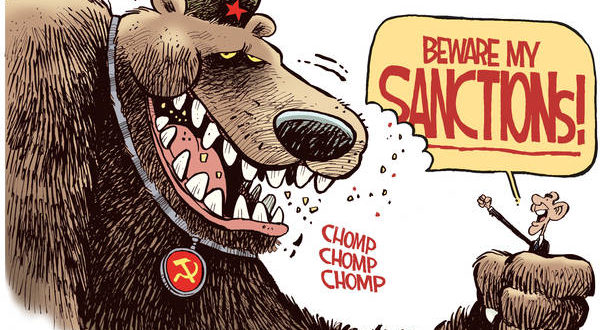Maria Dubovikova
The effectiveness of sanctions against Russia is debated all over the West. Some acknowledge that they do not work, and say it is time to launch a dialogue instead. Others argue that the sanctions have not achieved any visible results so far because they are insufficient, and they propose new sanctions until Russia cracks under the pressure.
The purpose of the sanctions, those already imposed and those proposed, is to change Russia’s foreign policy. The main targets are Russia’s elites. The calculation of those who support sanctions is that because these elites are close to President Vladimir Putin, putting pressure on them will lead to their putting pressure on Putin to be more flexible.
Their calculations were wrong. The elites are not angry with Putin, they are angry with sanctions.
The imposition of sanctions has boosted internal processes that would hardly even have been launched without significant external pressure. Russian society has consolidated and united, and the Kremlin has used this social wave for its own benefit. Russia has focused on developing its domestic economy, which it was too lazy to do before sanctions. Russians are now working on meeting demand using their own resources. The military-industrial complex, mostly in ruins after the collapse of the USSR, is now restored and expanding, boosted by external threats.
The latest “Kremlin list” of supposedly influential Russians, produced by the US Treasury at the end of January, was greeted with much sarcasm in Russia (not being included was “grounds for resignation,” Prime Minister Dmitry Medvedev joked). Nevertheless, it allowed Putin to urge businessmen named on the list to avoid sanctions by repatriating their wealth, which benefits the Kremlin. Capital has been fleeing Russia for a long time since the demise of the Soviet Union, as businessmen implemented tax-avoidance and money-laundering schemes, and sought refuge for their wealth in European and American banks. The new sanctions and the new list will probably drive them out of Europe and the US to Russia again.
European and American banks have launched investigations into the funds and deposits of foreign clients. If the client fails to prove the origin of their money, the bank may limit or even block the client’s transactions, or increase the fees and charges on such transactions. Such restrictions, regardless of whether the client is under sanctions, are making life difficult for Russia’s oligarchs.
Now that Russia has joined the Common Reporting Standard, the global mechanism for the automatic exchange of tax and financial information, it will be easier for Russian authorities to obtain full details of money kept overseas by its citizens. This better enables the Kremlin to restore money that was smuggled abroad. Furthermore, the new regulations will permit Russia to uncover money-laundering, tax fraud, suspicious income and so on. Russia is turning these challenges into opportunities. It is already working hard at encouraging Russian businessmen to return money home, giving them assurances at a high level. These include capital amnesties, which mean that wealthy Russians can freely declare their capital in foreign banks, overseas property and other assets. In return, Russia will not investigate or prosecute their companies. Russia has also issued special bonds to help businessmen to return capital threatened by sanctions. In many cases these measures are a lifebelt for wealthy Russians already facing tough pressure from Western banking and financial institutions.
Like the French emperor, those who think they can bend Moscow to their will take no account of the Russian spirit and mentality.
Maria Dubovikova
What is clear is that sanctions are not going to change the Kremlin’s course, or its way of thinking. The further implementation of sanctions is a risk for the global economy and the countries that impose them, as has already been admitted by financial institutions in Europe and the US. Furthermore, there is a probability that the flight of Russian capital from European and US financial and banking centers will weaken those countries and strengthen the Russian economy.
The truth is that sanctions and aggressive rhetoric from the West have served only to unite Russians in defiance. The most-quoted saying recently is that of Tsar Alexander III: “Russia has only two allies: its army and its fleet.” Russia has recalled its historical role and its national pride, which were trampled in the 1990s.
Aggressive statements from the West, mostly from the US and some minor European states — and rare calls to end the hysteria, mostly from Europe — are widely publicized by Russian state media. The effect on the public consciousness is to divide the world into friend or foe, and to consolidate the people into facing the aggressors.
Sanctions are irrelevant, and will never work against Russia in the way they work against other countries. They take no account of the Russian spirit and mentality. When Napoleon was conquering Europe, the continent’s leaders handed him the keys to their cities. The Russians, however, simply retreated, burning towns and villages behind them, and even gave up Moscow without ever actually surrendering. In the end, the French emperor fled back to Paris, defeated, his “grand army” in tatters.
Western countries have weak advisers on Russia. There is so much hatred that it blocks the capacity to think clearly. And that, literally, threatens the world.
• Maria Dubovikova is a prominent political commentator, researcher and expert on Middle East affairs. She is president of the Moscow-based International Middle Eastern Studies Club (IMESClub).
Twitter: @politblogme
 Geostrategic Media Political Commentary, Analysis, Security, Defense
Geostrategic Media Political Commentary, Analysis, Security, Defense





